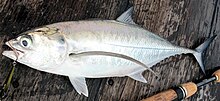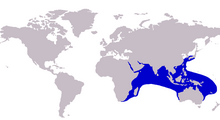Megalaspis
| Torpedo scad | |
|---|---|
 |
|
| Scientific classification | |
| Kingdom: | Animalia |
| Phylum: | Chordata |
| Class: | Actinopterygii |
| Order: | Perciformes |
| Family: | Carangidae |
| Genus: |
Megalaspis Bleeker, 1851 |
| Species: | M. cordyla |
| Binomial name | |
|
Megalaspis cordyla (Linnaeus, 1758) |
|
 |
|
| Approximate range of the torpedo scad | |
| Synonyms | |
The torpedo scad, Megalaspis cordyla (also known as the hardtail scad, finny scad, finletted mackerel scad and cordyla scad), is a species of moderately large marine fish classified in the jack and horse mackerel family, Carangidae. The torpedo scad is distributed throughout the tropical Indo-Pacific region, ranging from South Africa in the west to Tonga in the east, extending to Japan in the north and Australia in south. It is a schooling pelagic fish which occupies the surface layers of both inshore and offshore oceanic waters. The torpedo scad is easily identified by both its 'torpedo' shaped body and a series of detached finlets at the rear of both the dorsal and anal fins. The largest recorded individual was 80 cm long and weighed 4 kg, although it is more common at lengths less than 40 cm. It is a predatory species, taking a variety of fish, cephalopods and crustaceans by both active and filter feeding. There is a shift in diet as the species grow; however fish is the dominant prey in all size classes. Torpedo scad reach sexual maturity at 22 cm in females and 26.4 cm in males, with spawning occurring between March and July in India, where significant research into larval growth and morphometrics has been carried out.
...
Wikipedia
